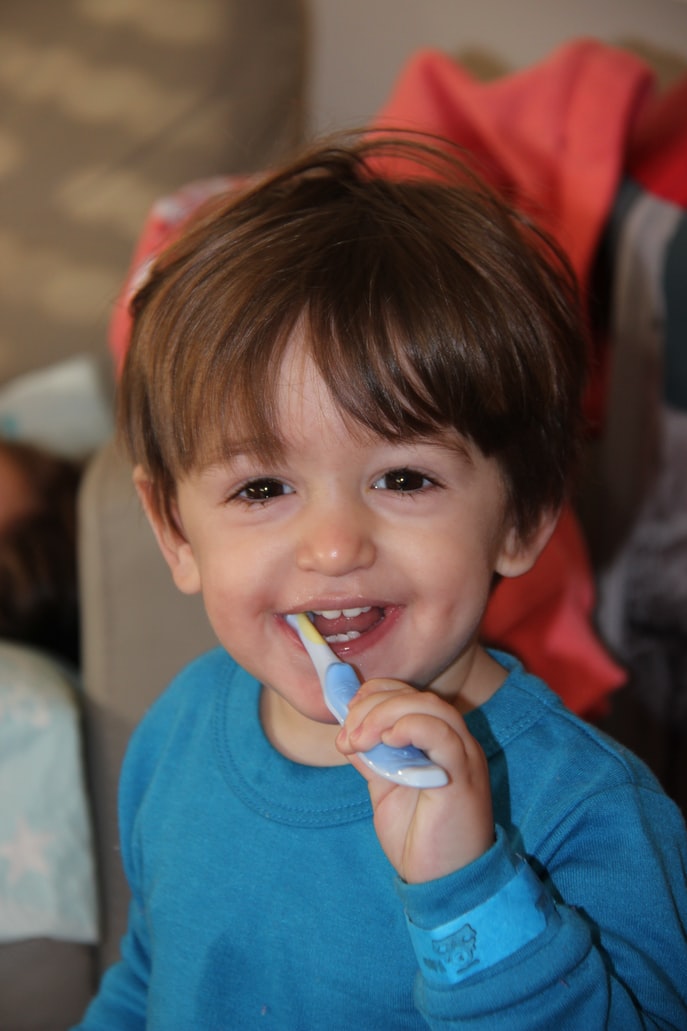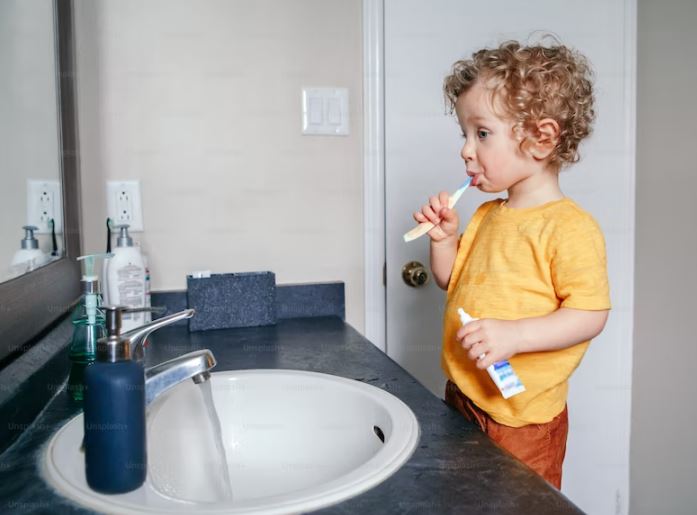The development of a baby’s first teeth begins while the baby is still in the mother’s womb. The 20 primary teeth that are present in newborns are covered by the gums at birth.
Teeth typically start to emerge anywhere between 6 and 10 months in most infants. However, some children get their first tooth as early as three months old. In other cases, they don’t show up until somewhere around a year later. A very small percentage of babies are born with one or two teeth already present. By the age of three, the vast majority of children have all 20 of their primary teeth.
The primary teeth can come out in any order; however, the lower incisors typically come out first, followed by the upper incisors. In most cases, the first molars come in next, which is then followed by the canines and the second molars.
Teething
As each primary tooth makes its way to the gum’s surface, the gum gradually separates from the tooth to reveal it. When a baby’s first teeth are emerging through the gum, the infant may irritate the area by rubbing his or her gums together. In most cases, this does not present a problem.
Many people believe that when babies are “teething,” they also:
- cry a lot or appear irritable;
- they don’t feed as well as usual;
- suck on objects such as toys, dummies, and bibs;
- have more dirty nappies; and
- pull the ear toward the side of the tooth’s eruption.
It’s possible that teething is to blame for these symptoms, but it’s also possible that they’re just a natural part of development or the result of minor infections and illnesses. It is always best to take your baby to your general practitioner if your baby isn’t feeling well, especially if the baby has a fever or diarrhea or if you are worried about any other symptoms that the baby may be experiencing.
Things to Try When the Baby is Teething
There are a few things you can do if you’re worried about your baby’s teething, including the following:
- giving your baby something to bite on, such as a toothbrush, dummy, or teething ring that is cold but not frozen
- offering your baby mushier foods, which need less chewing
- washing your hands before touching your baby
- giving your baby something to bite on, such as a toothbrush, dummy, or cold but not frozen teething ring
- providing your infant with a solid object, such as a rusk that does not contain any sugar, to gnaw on.
Teething gels are not typically recommended because it is likely that they do not alleviate the discomfort that is associated with teething. They may also come with some undesirable side effects.
If your infant continues to exhibit signs of distress or discomfort, it is time to make an appointment with your family doctor or a child and family health nurse. It’s possible that teething is not the issue.
Dental Care for the Teeth and Gums of Babies
You can begin providing dental care for your child’s baby teeth even before the first tooth erupts. When your child is about three months old, you should begin wiping his or her gums twice daily with a damp face washer or gauze that has been thoroughly cleaned. This prepares your child for brushing their teeth when they first appear, which is a huge benefit.
Use a gentle infant toothbrush that is made for children under 2 years old as soon as the first tooth emerges to clean the teeth. If your child resists having the toothbrush placed in their mouth, you can continue to use a clean face washer or gauze that has been dampened with water to wipe the front and back of each tooth instead.
If your baby’s dentist does not instruct you otherwise, you should continue to only use water on the toothbrush until your baby is 18 months old.
Effective Method for Cleaning a Baby’s Teeth
As parents, you can make the process of brushing your child’s teeth more enjoyable for them by providing them with an infant toothbrush that they can use to play with and put in their mouth while they are taking a bath. Make sure to keep an eye on your little one at all times while they are interacting with their toothbrush. You can also make tooth brushing more enjoyable for your baby by singing songs or letting them play with a toy while you brush their teeth.
- Place your infant in a position that allows you to see their mouth while also making them feel safe. It might be helpful to sit on a bed or the floor with your baby lying down so that their head is on your lap while you are rocking or singing to them.
- Put your baby’s head against your body so that it is supported by your body, and cup their chin in your hands.
- To properly clean your teeth, lift your child’s upper lip and use gentle, circular motions.
- Ensure that you give equal attention to the front and back of each tooth, as well as the gum line when you are brushing your teeth.
Maintaining the Toothbrush Clean
- Once you have finished brushing your infant’s teeth and gums, run the toothbrush under running water to clean it.
- You should keep the toothbrush standing up in an open container so that it can air-dry properly.
- It is recommended that you get a new toothbrush every three to four months, or whenever the bristles become worn or frayed.
Avoiding Tooth Decay at an Early Age
Even regular dental hygiene cannot fully protect teeth from developing cavities. Diet and how you feed your child are also very important factors to consider.
Breastmilk or formula should be the only food that infants consume for the first six months of their lives. Babies who are older than six months and are either breastfed or fed formula can also have small amounts of water. Sugary drinks should not be given to your child. Once you start giving your baby solid foods, you should also steer clear of giving them foods that are high in sugar.
You shouldn’t put your infant to bed with a bottle in their mouth. When your child is sleeping, there is less saliva in the mouth to protect their teeth. This can lead to tooth decay. If your child has trouble falling asleep while drinking from a bottle, the milk may slowly seep into their mouth and coat their teeth. Because of this, there is a chance that your child’s teeth will decay. Keep in mind that there is a risk of suffocation if you put your infant to sleep with a bottle.
Five Essential Tips to Manage Your Kid’s When Teething
Raising kids can have plenty of firsts and new experiences. There are things you never considered that was a big deal to you that now become a priority for your kid’s wellbeing. For instance, we completely forget about our milk teeth that were our first set of pearly whites. The memory of teething and having milk teeth erupt from baby gums is an experience we can’t recall very well; however, for your child, this is a rite of passage that can be quite itchy. If you’re wondering about what needs to be done to help your children have healthy gums and teeth from the get-go, you’ve arrived at the right place! This blog will give you five essential tips to manage your kid’s dental health when they’re in the teething and transitional phases.
- Hygiene: Milk teeth are the 20 teeth that your child will have to use for five to seven years of their life. When your child starts teething between 6-12 months, the gums begin to harden and itch, which can make them cranky and bitey. Children often get sick and feverish, biting at anything that can give them some relief. Ensure that all the footwear, car keys, remote controllers, and rubberized tools are kept away from their reach. Instead, give them sterilized teething toys.
- Regular checks: Occurrences like plaque, tartar and cavities can be detected early and cleaned by your local dentist. Also, your child could fall and break a loose tooth once the milk teeth are ready to fall off. Usually, they don’t bleed much, but if the bleeding causes some concern, get them checked at the emergency dental clinic as soon as possible. It could be an underlying gum injury that may not be visible to us or a clotting problem that the dentist can treat. You can also get them checked for teeth alignment and any damage to the roots with a dentist’s help.
- Brushing their tongue: The human tongue is more populated than bacteria than any other surface on the body. It is also the gateway to the stomach, which is why you’ll notice your child getting an upset stomach often if they don’t clean their tongue well. For babies, use a clean moist cloth to wipe their tongue. When your child can start brushing, teach them how to clean their tongue
- Stay away from mouthwash: As nice it is for us to use mouthwash, it is harmful when ingested, especially for children. We advise you to keep this item away until they grow up!
- Allow teeth to fall naturally: Our generation may have experienced a fair share of pranks where dads use all sorts of tricks to pull out loose milk teeth. However, it is advised for them to fall off naturally. If the tooth is very loose and hindering their meals, let a dentist do the job!
Wrapping Up
You may see many parents take their child’s initial dental health for granted when the first set of milk teeth arrive. Most think that these deciduous teeth being temporary aren’t any cause for alarm if they get cavities or plaque. It can be problematic to the roots and gums in the long run, so you can use our tips and ensure they have excellent oral health!




